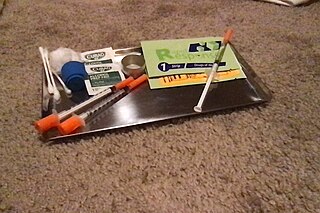
Hashish, also known as hash, "dry herb, hay" is a drug made by compressing and processing parts of the cannabis plant, typically focusing on flowering buds containing the most trichomes. It is consumed by smoking, typically in a pipe, bong, vaporizer or joint, or via oral ingestion. Hash has a long history of usage in countries such as Morocco, Egypt, Afghanistan, India, Nepal, Iran, Palestine and Lebanon. Hash consumption is also popular in Europe. In the United States, dried flowers or concentrates are more popular, though hash has seen a rise in popularity following changes in law. Like many recreational drugs, multiple synonyms and alternative names for hash exist, and vary greatly depending on the country and native language.

A bong is a filtration device generally used for smoking cannabis, tobacco, or other herbal substances. In the bong shown in the photo, the gas flows from the lower port on the left to the upper port on the right.

The prohibition of drugs through sumptuary legislation or religious law is a common means of attempting to prevent the recreational use of certain intoxicating substances.

"Drug paraphernalia" is a term to denote any equipment, product or accessory that is intended or modified for making, using or concealing drugs, typically for recreational purposes. Drugs such as marijuana, cocaine, heroin, and methamphetamine are related to a wide range of paraphernalia. Paraphernalia generally fall into two categories: user-specific products and dealer-specific products.

Thomas B. Kin Chong is a Canadian-American actor, comedian, musician, activist. He is known for his marijuana-themed Cheech & Chong comedy albums and movies with Cheech Marin, as well as playing the character Leo on Fox's That '70s Show. He became a naturalized United States citizen in the late 1980s.
A smart shop is a retail establishment that specializes in the sale of psychoactive substances, usually including psychedelics, as well as related literature and paraphernalia. The name derives from the name "smart drugs", a class of drugs and food supplements intended to affect cognitive enhancements which are often sold in smart shops.

Cannabis, also known as marijuana among other names, is a psychoactive drug from the cannabis plant. Native to Central or South Asia, the cannabis plant has been used as a drug for both recreational and entheogenic purposes and in various traditional medicines for centuries. Tetrahydrocannabinol (THC) is the main psychoactive component of cannabis, which is one of the 483 known compounds in the plant, including at least 65 other cannabinoids, such as cannabidiol (CBD). Cannabis can be used by smoking, vaporizing, within food, or as an extract.
A gravity bong, also known as a GB, geebie, bucket bong, grav, geeb, yoin, jib, buckie or ghetto bong, is a method of consuming smokable substances such as cannabis. The term describes both a bucket bong and a waterfall bong, since both use air pressure and water to draw smoke. A lung uses similar equipment but instead of water draws the smoke by removing a compacted plastic bag or similar from the chamber.
Lacing or cutting, are drug slangs for the act of using a substance to adulterate substances independent of the reason. The resulting substance are refereed by the slang terms laced or cut.

Cannabis smoking is the inhalation of smoke or vapor released by heating the flowers, leaves, or extracts of cannabis and releasing the main psychoactive chemical, Δ9-tetrahydrocannabinol (THC), which is absorbed into the bloodstream via the lungs. Archaeological evidence indicates cannabis with high levels of THC was being smoked at least 2,500 years ago.

A drug is any chemical substance that causes a change in an organism's physiology or psychology when consumed. Drugs are typically distinguished from food and substances that provide nutritional support. Consumption of drugs can be via inhalation, injection, smoking, ingestion, absorption via a patch on the skin, suppository, or dissolution under the tongue.
Operation Pipe Dreams was an American nationwide investigation in 2003 targeting businesses selling drug paraphernalia, mostly marijuana pipes and bongs, under a little-used statute. Due to the reluctance of state law-enforcement agencies to contribute resources to the operation, most cases were filed in Iowa and Pennsylvania, taking advantage of the statute's prohibition on the use of "the mails or any other facility of interstate commerce to transport drug paraphernalia."

Spots refers to a method of smoking cannabis. In this method, small pieces of cannabis are rolled to form the "spot". The practice originated in the 1970s when drops or dabs of hashish oil were smoked. Generally, the tips of two knife blades are heated, the spot is compressed between the two blades, and the subsequent smoke is inhaled through the nose or mouth. Another means that is gaining popularity is specially made glass presses heated with a propane or butane torch. In order to facilitate this process, a "spottle" or "hitter" is often, but not always, used to funnel the smoke and maximize the amount inhaled. A spottle is generally made from a funnel or cone-shaped container, such as the top of a plastic or glass bottle or a gallon of milk/water.

Cannabis consumption refers to the variety of ways cannabis is consumed, among which inhalation and ingestion are most common. All consumption methods involve heating the plant's THCA to decarboxylate it into THC, either at the time of consumption or during preparation. Salves and absorption through the skin (transdermal) are increasingly common in medical uses, both of CBD, THC, and other cannabinoids. Each method leads to subtly different psychoactive effects due to the THC and other chemicals being activated, and then consumed through different administration routes. It is generally considered that smoking, which includes combustion toxins, comes on quickly but lasts for a short period of time, while eating delays the onset of effect but the duration of effect is typically longer. In a 2007 ScienceDaily report of research conducted at the University of California–San Francisco, researchers reported that vaporizer users experience the same biological effect, but without the toxins associated with smoking. Δ9-THC is the primary component when inhaled, but when eaten the liver converts this to the more psychoactive 11-hydroxy-THC form.

Synthetic cannabinoids are a class of designer drug molecules that bind to the same receptors to which cannabinoids in cannabis plants attach. These novel psychoactive substances should not be confused with synthetic phytocannabinoids or synthetic endocannabinoids from which they are in many aspects distinct.

A grow shop or growshop is a retail store that sells equipment and supplies for growing plants indoors. Types include stores selling hydroponic systems for horticulture, and those devoted to cannabis cultivation.
Hoffman Estates v. The Flipside, Hoffman Estates, Inc., 455 U.S. 489 (1982), is a United States Supreme Court decision concerning the vagueness and overbreadth doctrines as they apply to restrictions on commercial speech. The justices unanimously upheld an ordinance passed by a Chicago suburb that imposed licensing requirements on the sale of drug paraphernalia by a local record store. Their decision overturned the Seventh Circuit Court of Appeals.

Cannabis in Egypt is illegal, however it is widely used but not publicly. Law enforcements are often particularly lax when it comes to Cannabis smokers. Also, its use is a part of the common culture in the country for many people. Large-scale smuggling of cannabis is punishable by death, while penalties for possessing even small amounts can also be severe. Despite this, these laws are not enforced in many parts of Egypt, where cannabis is often consumed openly in local cafes.

Cannabis in Nepal has been illegal since 1976, but the country has a long history of use of cannabis for Ayurvedic medicine, intoxicant and as a holy offering for Hindu god Shiva and continues to produce cannabis illicitly.

Terms related to cannabis include:

















